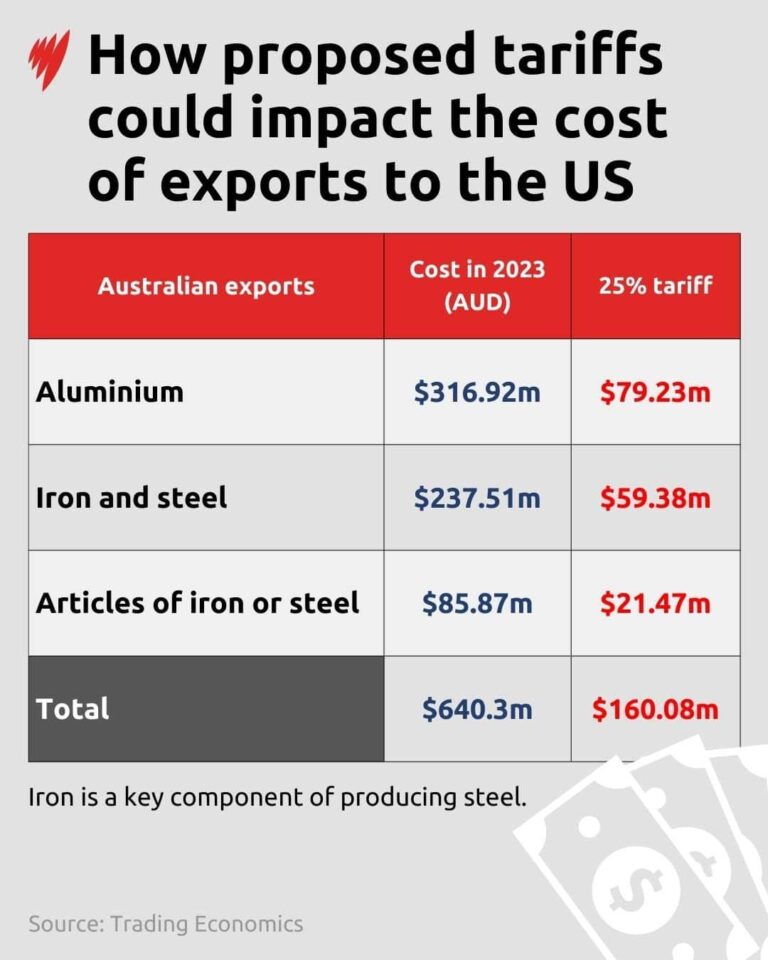Australia Chooses Diplomacy Over Retaliation Amid US Steel Tariff Measures
Following the United States’ implementation of steel tariffs under the Trump administration, Australia has decisively ruled out imposing counter-tariffs. Australian policymakers have underscored their dedication to preserving open trade channels and resolving disagreements through diplomatic engagement rather than escalating trade conflicts. This measured response reflects Australia’s adherence to a rules-based international trade system, even as protectionist tendencies gain momentum globally.
Australia’s approach is anchored in several core principles:
- Commitment to multilateral frameworks: Utilizing institutions such as the World Trade Organization (WTO) to address trade disputes constructively.
- Economic prudence: Avoiding retaliatory actions that could destabilize markets or harm domestic sectors.
- Support for integrated supply chains: Acknowledging the interconnected nature of global economies and the risks posed by tit-for-tat tariffs.
| Dimension | Australia’s Approach |
|---|---|
| Trade Reaction | Refrains from reciprocal tariffs |
| Diplomatic Strategy | Engagement through WTO and bilateral discussions |
| Economic Focus | Maintain market equilibrium |
Analyzing the Economic Consequences of US Steel Tariffs on Australia
The introduction of steel tariffs by the United States has significantly influenced trade dynamics with Australia. Despite the increased financial strain on Australian steel producers, Canberra has opted against retaliatory tariffs, prioritizing the preservation of strong diplomatic and economic relations. Analysts interpret this as a strategic move to uphold a cooperative trade environment beyond isolated tariff disputes.
The tariffs have raised several economic concerns, including:
- Escalated production costs for Australian industries dependent on US steel;
- Heightened market uncertainty impacting investor confidence;
- Disruptions to supply chain continuity across critical sectors.
Nevertheless, Australia’s restraint has averted further trade escalation, granting businesses the opportunity to adjust and explore alternative markets. This stance highlights the vital role of dialogue and multilateral mechanisms in mitigating trade tensions that could jeopardize economic stability for both countries.
| Industry | Effect | Australia’s Response |
|---|---|---|
| Steel Sector | Decline in US market demand | Expanding into new export markets |
| Automotive Manufacturing | Increased raw material expenses | Absorbing costs and optimizing supply chains |
| Construction Industry | Rising project costs | Sourcing steel from alternative suppliers |
Diplomatic Significance of Australia’s Non-Retaliation Policy
Australia’s decision to abstain from retaliatory tariffs against the United States reflects a strategic emphasis on sustaining long-term diplomatic ties rather than pursuing immediate economic retribution. By sidestepping escalation, Canberra reinforces its commitment to a multifaceted alliance with Washington, encompassing defense cooperation, trade relations, and regional security interests. This policy aligns with Australia’s broader foreign policy goals of promoting stability within the Indo-Pacific region and exemplifies a preference for constructive engagement over confrontation.
This prudent stance conveys a clear message internationally: Australia prioritizes dialogue and cooperation even amid challenging trade disputes. The diplomatic ramifications include:
- Safeguarding strategic partnerships: Upholding commitments under the ANZUS treaty and shared geopolitical objectives.
- Minimizing risk: Preventing retaliatory cycles that could damage Australian exporters and disrupt supply chains.
- Enhancing diplomatic leverage: Positioning Australia as a mediator balancing economic interests with pragmatic diplomacy.
| Dimension | Diplomatic Outcome |
|---|---|
| US-Australia Alliance | Reinforced trust and collaboration in strategic domains |
| Trade Relations | Prevention of retaliatory escalation protects exporters |
| Global Reputation | Recognized as a responsible and balanced international actor |
Strategies for Managing Future Trade Conflicts
To reduce the adverse effects of unilateral tariff actions and safeguard economic interests, Australia should focus on bolstering multilateral trade agreements and enhancing dispute resolution processes. Strengthening collaboration within organizations like the WTO and regional trade blocs can amplify collective efforts to counteract protectionist policies. Additionally, increasing transparency in trade negotiations and monitoring mechanisms will help anticipate and defuse potential conflicts before they escalate.
On the domestic front, policymakers need to strike a balance between protecting national industries and preserving open market access. Recommended measures include:
- Building resilient supply chains to lessen vulnerability to external shocks;
- Engaging in proactive diplomatic outreach to foster mutual understanding and prevent retaliatory actions;
- Providing targeted support to sectors impacted by trade disruptions while encouraging diversification.
| Policy Area | Recommended Action | Anticipated Benefit |
|---|---|---|
| Multilateral Engagement | Enhance WTO compliance and cooperation | Mitigation of tariff escalations |
| Supply Chain Security | Diversify sourcing and logistics | Greater economic resilience |
| Diplomatic Relations | Maintain regular bilateral dialogues | Strengthened trade partnerships |
Conclusion
Australia’s firm decision to refrain from retaliating against the United States following the imposition of steel tariffs highlights the intricate challenges of balancing allied trade relationships amid rising global protectionism. While Canberra remains steadfast in its support for open markets and free trade, this episode underscores the delicate equilibrium governments must maintain between safeguarding national economic interests and nurturing vital diplomatic alliances in an increasingly unpredictable international economic environment.







